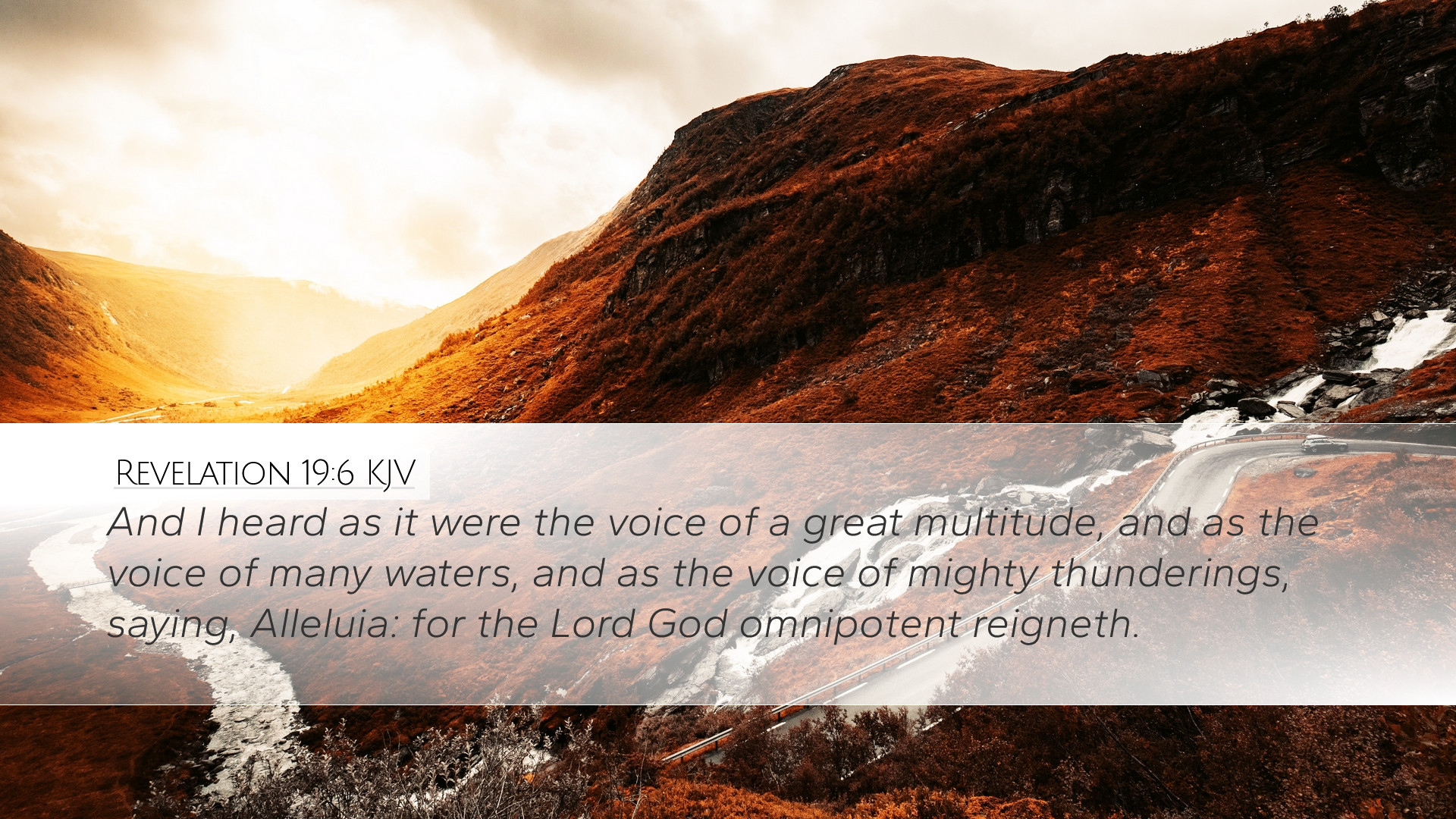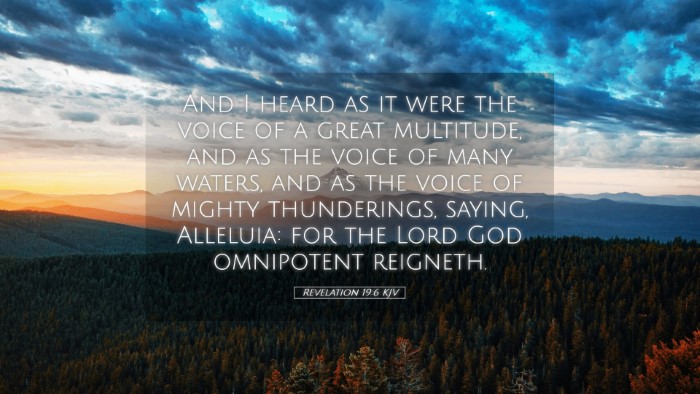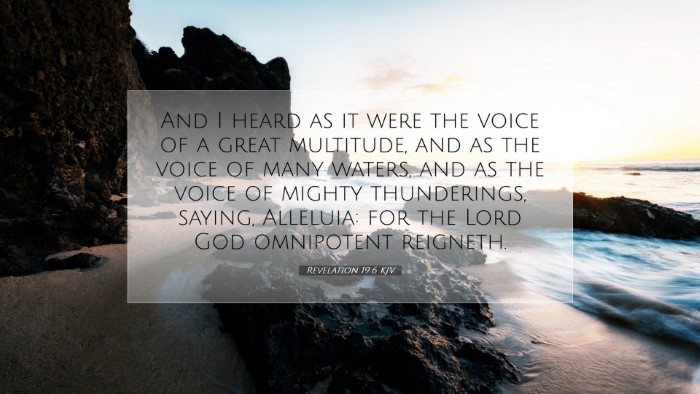Commentary on Revelation 19:6
Verse Text: "And I heard, as it were the voice of a great multitude, and as the voice of many waters, and as the voice of mighty thunderings, saying, Alleluia: for the Lord God omnipotent reigneth."
Introduction
Revelation 19:6 presents a powerful vision of worship and exaltation, declaring the sovereignty of God. This verse encapsulates the triumphant worship in Heaven, responding to the ultimate victory of God over His enemies. Various commentaries offer profound insights into the implications and significance of this declaration, weaving together themes of divine authority, eschatology, and worship.
Insights from Public Domain Commentaries
Matthew Henry's Commentary
Matthew Henry highlights that the loudness and multitude of the voices signify a collective expression of joy and triumph among the redeemed. He emphasizes the phrase "the Lord God omnipotent reigneth," which underscores God's supreme power and rightful sovereignty over all creation. Henry elucidates that this declaration serves as both a comfort and an assurance for believers, reminding them that despite earthly challenges, God is in ultimate control.
Furthermore, Henry interprets the great multitude as representative of all redeemed humanity, gathered around God's throne. This image portrays the unity of believers across time and space, celebrating God's victory. The exclamation of "Alleluia" marks a pivotal moment in the narrative, celebrating the final victory and judgment against evil.
Albert Barnes' Notes
Albert Barnes emphasizes the significance of the heavenly chorus. He notes that the sound likened to "many waters" and "mighty thunderings" indicates both the overwhelming power and the contagious enthusiasm of heavenly worship. Barnes suggests that this indicates the authenticity and intensity of the affirmation of God’s reign, which should inspire believers to reflect on their own worship practices.
He also clarifies the context of this verse within the broader narrative of Revelation, pointing out that it follows the destruction of Babylon, symbolizing the defeat of corrupt earthly powers. The proclamation of God’s reign comes as a response to this victory, highlighting the theme of divine justice and triumph over injustice. The phrase "Alleluia" is particularly significant; it is the only time it appears in the New Testament, marking the culmination of praise reserved for God's ultimate victory.
Adam Clarke's Commentary
Adam Clarke provides a detailed exposition of the phrase "the Lord God omnipotent reigneth." He stresses that the omnipotence of God is a fundamental aspect of His nature, assuring Christians of His active involvement in the affairs of the world. Clarke interprets the voices as a call to recognize God's rule and sovereignty, suggesting that worship should stem from an understanding of God's authority.
Clarke also points out that the multitude's declaration signifies not only a present reality but a future hope. The reign of God is assured and will be ultimately fulfilled; thus, believers should adopt a posture of expectation and hope. He suggests that this verse invites believers to participate in this eternal worship now, foreshadowing the worship that will take place in the fullness of the kingdom.
Theological Implications
This verse serves as a critical reminder of God's sovereignty and the eschatological hope present in Christian theology. The collective voice of the multitude underscores the communal aspect of Christian worship, transcending individualistic notions of faith. It illustrates the importance of being part of a larger body of believers, united in praise to God.
Moreover, the declaration of God's reign invites theological reflection on the nature of power and authority in the world. In a time marked by conflict and division, this verse reaffirms that God's omnipotence surpasses earthly powers, encouraging believers to place their trust in His divine governance.
Application for Pastors and Theologians
- Encouragement for Worship: Pastors can draw from this verse to encourage congregations to engage in vibrant and collective worship, reflecting the heavenly experience depicted in Revelation.
- Teaching on God's Sovereignty: The verse provides a framework for preaching on God's nature and His active rule over creation, fostering a deeper understanding of divine providence.
- Communal Unity: The imagery calls for unity among believers, urging churches to work together in faith, embodying the joyful proclamation of God’s reign.
- Eschatological Hope: The verse can also lead to discussions on the end times, highlighting the assurance that God will ultimately triumph, encouraging believers in their faith during trials.
Conclusion
Revelation 19:6 serves as a rich tapestry of worship, hope, and divine authority. As various commentaries illustrate, the verse encapsulates the essence of the Christian faith—celebrating a God who reigns supremely and is actively engaged in the redemption of His creation. For pastors, students, theologians, and scholars, understanding this passage invites a deeper engagement with the themes of worship, community, and the assurance of God's ultimate victory over evil.


